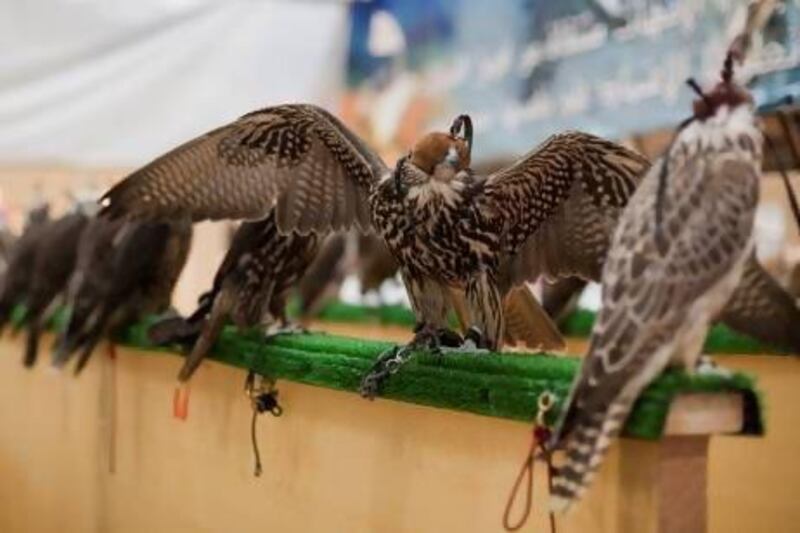DUBAI // Falcons worth up to Dh100,000 each are dying because of an incurable and highly infectious avian disease that can be easily prevented, an expert says.
Newcastle disease is a major killer of falcons in the UAE and the rest of the region. But vaccines against it are readily available.
“It is a viral disease,” said Dr Jaime Samour, the wildlife director at Sheikh Sultan bin Zayed’s animal sanctuary at Wrsan, Abu Dhabi.
“Some areas of the world are free of it but here it is relatively common. There is no treatment but there is prevention. There are vaccines available that can be administered to falcons and provide good immunity.
“Falcons should be vaccinated before training begins and then every year, and that will avoid any problem. It is surprising how little people know about falcon diseases. There is a lack of awareness.”
The price of a falcon in the UAE ranges from Dh4,000 to Dh5,000 for a peregrine and up to Dh100,000 for a top-quality gyrfalcon.
Dr Samour said the deadly disease was often transmitted through pigeons.
“People here traditionally tend to use pigeons for training falcons,” he added. “Falcons usually acquire the disease by being in close contact with pigeons during training and exercise, or by eating them.
“You have a Dh100,000 bird and you feed it a Dh10 pigeon – it just doesn’t make any sense.
“In one outbreak in Abu Dhabi some years ago 125 falcons died. All the falcons were fed on quail and the quail had a massive outbreak of Newcastle disease, so all the falcons got infected from a single source.”
Such devastation can be avoided if infected birds are isolated as soon as symptoms appear.
The disease was first recorded in Newcastle upon Tyne in the UK in 1926 and can infect a wide range of wild and domestic birds, including all types of falcon.
Intensively farmed poultry are at particular risk because the virus can sweep through vast numbers of birds in restricted spaces.
Because of this the disease is treated extremely seriously in the poultry industry, and any outbreak would have to be reported to the Ministry of Environment and Water.
Dr Samour said not all falconers were as diligent about informing the authorities and in some cases the disease was not identified, increasing the risk of it spreading.
As a result there are no accurate figures showing the scale of the problem, but Dr Samour estimates the disease is responsible for more than 15 per cent of falcon deaths here each year.
“Some falconers use traditional Arab methods to try to cure their birds,” he said.
“Unfortunately one of these is branding them with hot irons, which can produce horrible wounds. Some of them believe they can treat Newcastle disease, but that’s not correct.”
The virus can be transmitted to people, but is not fatal to humans and is treatable because it affects human systems in a different way.
Dr Samour said he was not aware of any human cases in the UAE, but it was an ever-present threat.
“A friend overseas, a veterinarian, and his wife contracted Newcastle disease. You get this by being in contact with infected birds.
“It manifests as severe conjunctivitis. The eyes are really bad to the point that you have to keep them closed. I know cases in which the infection was so severe that the patient lost an eye because of complications.”
During the Cold War the US conducted trials involving the use of the Newcastle disease virus as a biological weapon that would destroy poultry in enemy territory. But the disease could have more beneficial uses.
The virus can attack and destroy tumour cells while leaving healthy cells virtually unaffected, and research has been carried out into its possible use as an anti-cancer agent in humans.
Dr Samour will speak about the impact of the disease on falcons tomorrow at the Veterinary Outlook Forum, which is being held alongside the VETme trade show at Dubai World Trade Centre.






